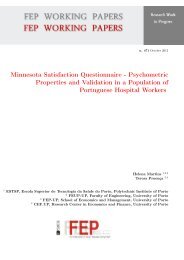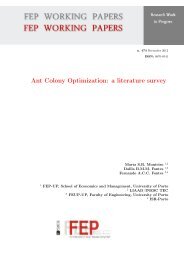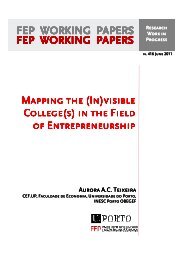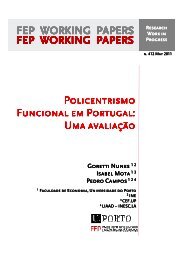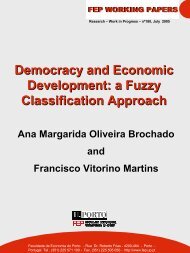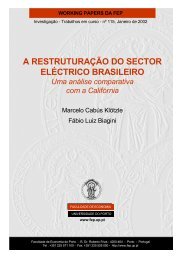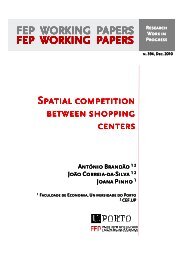Capa wps - FEP - Working Papers - Universidade do Porto
Capa wps - FEP - Working Papers - Universidade do Porto
Capa wps - FEP - Working Papers - Universidade do Porto
You also want an ePaper? Increase the reach of your titles
YUMPU automatically turns print PDFs into web optimized ePapers that Google loves.
The analysis of the nature of knowledge and learning is crucial for a more comprehensive<br />
conceptualization of the firm. Neoclassical economics is not able to capture the perspective of<br />
learning as developmental and reconstructive process and not as a plain input of facts (Foss, 1997).<br />
In fact, for the mainstream, learning is interpreted as the cumulative process involving the<br />
acquisition of codifiable knowledge, where learning itself appears as informational absorption, is<br />
rather reductionistic (Cohendet and Steinmueller, 2000). Even when conceived as a Bayesian<br />
revision of subjective probability in the light of incoming data, it shows several problems, for<br />
example the fact that a process of Bayesian learning in search for an optimum depends on the<br />
existence of accurate former knowledge (Key, 1981; Dosi and Egidi, 1991). Although<br />
organizational knowledge interacts with individual knowledge (Winter, 1988; Dosi and Marengo,<br />
1994), it is more than the sum of individual parts. It is context-dependent, bounded by culture and<br />
institutionalized (Hodgson, 1999).<br />
In sum, evolutionary economists highlight Knight’s core idea that the existence of the firm in the<br />
real world is the result of the presence of uncertainty.<br />
Most imperative for the development and spread of evolutionary economics seems to be the digital<br />
computer, although the influence of the computer in developments within economics is very young.<br />
Mirowski (2002) highlights the rise of the ‘cyborg’ sciences, which occurred mainly in the USA<br />
during the World War II, and its profound effects for the content and organization of natural and<br />
social sciences. He stresses the pressure exerted by the current scientific diaspora - caused by the<br />
impact that the end of the Cold War and the associated changes in the funding of scientific research<br />
had on physics, with “the … contraction of physics and the continuing expansion of molecular<br />
biology” (Mirowski, 2002: 10) -, for the beginning of the transformation of economic concepts. As<br />
a result of such interdisciplinary research, a different method of economics has emerged, based on a<br />
combination between computational languages and institutional themes. According to Mirowski<br />
(2002: 11), the reluctance of economists to aban<strong>do</strong>n the classical mechanics paradigm in favour of a<br />
new paradigm based in computer science and in cognitive sciences in general results in “numerous<br />
tensions in fin-de-siècle ortho<strong>do</strong>x economics”.<br />
The reinforcement of evolutionary economics seems unquestionably associated to the development<br />
of computational methods, which has increasingly allowed dealing with the complexity associated<br />
to its open-system approach.<br />
In the next section some considerations are made concerning what appears to be an excessive<br />
emphasis on modelling and formalization issue on the behalf of evolutionary researchers. As<br />
<strong>do</strong>cumented below, empirical related research has been relatively neglected.<br />
19



